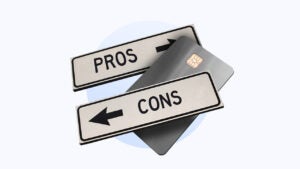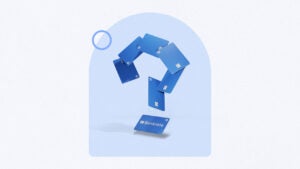Should you get a credit card?

Key takeaways
- Credit cards are powerful financial tools that have helped millions of consumers build and rebuild credit, earn rewards and pay off major purchases over time.
- But when used irresponsibly, they can also cause consumers to slip into vicious debt cycles that can be hard to get out of.
- If you’re on the fence about getting a new credit card, be sure to consider your spending habits and financial situation, as well as what you’re hoping to get from a credit card, before you apply.
Having a credit card can be an asset when it comes to building or maintaining a good credit history, but it can also be a gateway to debt, depending on what type of spender you are.
The decision to apply for a credit card shouldn’t be taken lightly. Your credit history isn’t something you can erase down the road, so it’s important to analyze your personal spending habits and financial goals prior to using a card to build or rebuild your credit.
Also, keep in mind that current credit card interest rates are high — over 20 percent, in fact. If you do get a credit card, be careful not to carry a balance on it or engage in irresponsible spending. Racking up a balance may cause you to become stuck in debt, which ultimately could destroy your credit score and financial health.
Do you need a credit card?
If you’re wondering, “Should I get a credit card?” this guide can help you understand when getting a card could be beneficial and when you might be better off without one.
| You should get a credit card if… | You shouldn’t get a credit card if… |
|---|---|
| You want to build or rebuild your credit history | You have difficulty controlling your spending |
| You want to raise your credit score | You’ve recently applied for or are about to apply for a car loan, home loan or other major loan |
| You want to finance a purchase or pay off debt (with a 0 percent introductory APR card) | You have more credit cards than you can handle |
| You want to earn rewards from your spending | |
| You want a more secure way to make payments than a debit card |
When does getting a credit card make sense?
Credit cards can be valuable tools in navigating and managing your finances. Here are a few scenarios where it might make sense for you to apply for a new credit card:
If you want to build or rebuild your credit history
Used responsibly, a credit card can help you build the credit history you need to access financial support. According to Rasha Katabi, CEO and founder of Brim Financial, “Whether it’s in a mortgage or a loan or a business loan — whatever it is that you require in terms of financial support to build your business, your life and your wealth — it’s important to have credentials in the world of credit.”
Without sufficient credit history, lenders will likely see you as a higher risk — which may result in denial of that loan or mortgage you want.
If you have limited or no credit, consider a secured credit card. In order to compensate for your lack of credit, lenders will require you to submit an initial deposit that will set the basis for your line of credit or what you’ll be able to borrow. Your payment history may then be reported to the three major credit reporting bureaus — Equifax, Experian and TransUnion. These types of cards can be especially helpful to young adults looking to build credit.
Some issuers, like Discover and Capital One, offer pathways to help people transition from a secured card to an unsecured card after six months to a year of responsible use. If you qualify, both the Discover it® Secured Credit Card and the Capital One Platinum Secured Credit Card can be converted to unsecured cards — which could also result in a refund of your security deposit and even a higher credit limit.
If you want to increase your credit score
Credit cards can be one of the easiest ways to help you improve your FICO credit score. In addition to building a positive credit history by making your payments on time — which accounts for 35 percent of your FICO score — your credit score will likely increase due to these factors:
- Credit mix: This refers to the different types of credit products you own and makes up 10 percent of your FICO score. So if you already have a car loan or a mortgage, for example, a credit card can add to your credit mix.
- Credit utilization ratio/ amounts owed : Your credit utilization ratio refers to the amount of credit you’re using compared to the total amount of credit you have available. It, along with your total debt balance and several other factors, makes up 30 percent of your FICO score. Opening a new credit card can have a positive effect on your credit score if you’re able to keep your balance on the card low relative to the card’s credit limit, causing your overall credit utilization ratio to go down.
The generally accepted rule is to aim for a credit utilization of around 30 percent. However, Beverly Harzog, credit expert, author and podcast host, advises keeping your credit utilization ratio below 10 percent.
You know, use a low utilization ratio — below 10 percent, really — to boost your score, and pay your bill in full and on time. Do that for seven or eight months and you’re going to see some progress.— Beverly Harzog
Keep in mind: You might see a temporary dip in your credit score immediately after applying for a new credit card. This is because the issuer will run a hard credit inquiry, which will allow them to view your credit report in full. Your score should bounce back once you start using your new card responsibly.
If you need help financing a purchase or paying off debt
Your card’s annual percentage rate (APR) refers to the interest you’ll pay on your credit card when you carry a balance from month to month. While most cards have high interest rates compared to something like a personal loan, some credit cards offer a 0 percent introductory APR period on purchases and balance transfers for a limited time. With these offers, you’ll pay no interest for a set period of time, usually between 12 and 21 months.
If you need some leeway when it comes to financing a major purchase, or if you know you’ll need some extra cushioning in paying off a debt, you might want to consider a card with a 0 percent introductory APR offer. With one of these cards, it’ll be as if “You’ve been able to get a loan interest-free, basically,” Harzog says.
But, make sure you have a plan to pay off the entire balance before the introductory APR period ends, or else the remaining balance will start accruing interest at the regular APR. If you’re using a 0 percent introductory APR card to pay off a balance transferred from another credit card, you’ll also need to account for balance transfer fees that can range from three to five percent of the transferred balance.
If you want to get rewarded for your spending
Using a cash back or travel rewards card responsibly can also help you save money. Think about how you spend your money, then choose a credit card that offers rewards on purchases you make the most. Maybe you want a card that rewards the basics, like gas or groceries, with simple cash back. Or maybe you travel often for work and want to rack up points or miles with an airline credit card.
“My wife and I have been able to completely pay for a handful of vacations over the last few years by simply using a travel rewards card each month,” says Kelan Kline, co-founder of The Savvy Couple, a personal finance blog. “These are vacations we might not have even gone on if they were not paid for by travel rewards.”
You don’t necessarily need an excellent credit score to qualify for a rewards credit card, either. Banks and creditors consider a FICO score of 670 to 739 to be a “good” credit score, and this could be enough to help you land some of the best credit cards out there. You likely won’t see the lowest interest rates or highest credit limits with this type of score, but if you set a budget and plan to pay your bills on time, you’ll still come away with rewards you can use for everything from cash back to travel.
If you want added payment security
Debit cards are usually good for those who need help sticking to a budget, as the funds drawn from debit accounts are pulled directly from your bank account. However, if your debit account is compromised or if fraudulent charges are made, the process of recovering your funds can get a little trickier.
If your access device (such as a debit card) is lost or stolen and you report it to your financial institution within two business days of learning about the loss or theft, the Electronic Fund Transfer Act (EFTA) ensures you’re only liable for a maximum of $50 of unauthorized charges. Reporting the loss or theft after two business days but within 60 calendar days of the unauthorized charge appearing on your account statement means you’re liable for up to $500. For unauthorized charges that occur after more than 60 calendar days after the first unauthorized charge appears on your account statement, you could be paying the entire bill for that fraudulent charge. The rules are different for unauthorized charges that don’t involve a lost or stolen access device, and your liability in that case can range from no liability to unlimited liability, depending on when you report the unauthorized charge.
While it’s nice knowing you have some protections, bear in mind that banks and credit unions may require written confirmation of the error and have 10 business days to complete their investigation. This means you could be lacking those funds for almost two weeks.
You won’t have to deal with these types of pains if you find a fraudulent charge on your credit card. Your real money isn’t on the line, and issuers typically offer some form of zero-liability policy on fraudulent credit card charges.
“If you find suspicious charges, you report them, they get wiped off and you don’t have to pay for it,” says Ted Rossman, senior industry analyst at Bankrate.
Federal protections exist for credit card fraud, too. The Fair Credit Billing Act (FCBA) caps your liability on charges you didn’t make at $50. You still have a 60-day window to report, but you’re not dealing with your immediate funds in the meantime.
When does getting a credit card not make sense?
While many good things can come from getting a new credit card, it might not be the right time for you to get one. Here are some situations where it likely doesn’t make sense for you to get a new card right now:
If you have difficulty controlling your spending
A credit card can be great for funding large purchases with a 0 percent APR offer or for covering emergency expenses in a pinch. However, it’s not great for covering purchases that consistently cause you to carry a balance on your credit card. Impulse buying, in particular, can lead to carrying hefty balances, and balances that aren’t paid in full can accrue a substantial amount of interest over time.
If you’re spending more than you can pay off monthly on your card and you want more buying power, a new credit card won’t improve your financial situation, especially given their high interest rates.
“If you’re feeling like you’re getting the credit card because you need that little bit of extra cushion, or you want to borrow against it, and you’re seeing it as a form of lending, I would be a little bit more cautious of that,” says Colin Walsh, CEO and co-founder of app-based banking service Varo Money.
Harzog agrees, cautioning potential cardholders to think hard about their spending habits and the way they would use a credit card.
Now, there is one other situation where you should never get a credit card. And that’s if you can’t use cards responsibly. There’s no shame in that. We all have weaknesses, so just be honest, and if that’s the situation, you should not use a credit card.— Beverly Harzog
If you’ve recently applied for a major line of credit
You should also avoid applying for a new credit card if you’ve recently placed or plan to place another major credit application. So, if you’re refinancing your house, buying a new car or taking out a loan, you’ll want to avoid a credit card application and the added hard inquiry it will place on your credit score.
Not only will applying for a credit card around the same time as another loan decrease your credit score, but it’ll also make lenders suspicious of you. “A lender who is trying to approve you for a mortgage might see that and think, ‘Why is this person also applying for a credit card? Are they expecting to have money problems if I give them this mortgage?’ All of these things can go through lenders’ minds,” says Harzog.
If you already have too many cards
Having more than one credit card can help reduce your credit utilization ratio — assuming having more cards doesn’t cause you to spend more — because you’ll have the same total balance but a larger total credit line. On the other hand, having several credit cards can make it difficult to keep track of which ones to use for which purchases. Not to mention the temptation it can bring to allow you to overspend. Deciding how many credit cards you should have involves an honest analysis of your budget and goals.
Carrying multiple credit cards means you’ll need to stay organized, both so you can maximize any rewards you are earning and so you don’t fall behind on your payments. While missing out on some rewards isn’t the end of the world, missing payments or racking up huge amounts of debt can have a major impact on your financial health.
If having that much credit available is too tempting or too much for you to track, adding another credit card to the mix is something you should avoid.
You’ll also want to avoid applying for multiple cards at once, as this will impact your credit score. “If you’re not planning on applying for major credit any time soon, let’s say in the next year, you could probably get two cards and spread it out over four months,” says Harzog.
The bottom line
Thinking about both the advantages and disadvantages of using a credit card can help you understand whether a credit card is truly what you need right now.
Opening and managing a credit card requires diligence and an analysis of your resources and spending habits. If you open a credit card account, be careful to spend comfortably within your means so that you don’t carry a balance. By using your credit card responsibly, you can start to build credit and reach your financial goals.
A secured credit card could be a good place to start for those who are new to credit cards or have bad credit. For those who already have established credit and a good credit score, consider using Bankrate’s card comparison tool to help you decide between today’s top credit cards.
Why we ask for feedback Your feedback helps us improve our content and services. It takes less than a minute to complete.
Your responses are anonymous and will only be used for improving our website.






